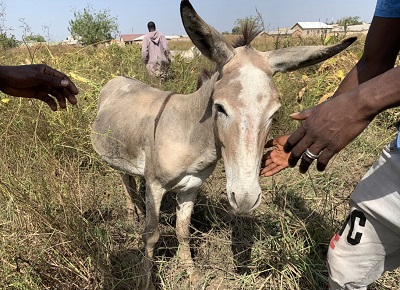
Ban donkey hide trading - Animal welfare charity
The Regional Director of Brooke West Africa, Mr Emmanuel BouréSarr, has called for a global ban on the trade of donkey skins and a crackdown on cross-border smuggling of donkeys for their skins.
Brooke West Africa is an international animal welfare charity that protects and improves the lives of horses, donkeys and mules.
Mr BouréSarr said the slaughter of the mammal had led to a sharp decline in their population and was adversely affecting communities that were donkey-dependent.
He made the calls at the opening of a two-day workshop organised by Ghana Poultry Network (GAPNET), in collaboration with Brooke, in Accra, last Tuesday.
He also called on West African countries where donkeys contributed to the livelihoods of communities to rise up and fight donkey hide trade.
The workshop was aimed at developing a national advocacy action plan for the preservation and the welfare of donkey species, as well as the trade in donkeys in Ghana and in West Africa.
Africa is said to have the largest equid populations in the world, and they serve essential purposes to the livelihoods of millions of families around the world.
Mr BouréSarr explained that the slaughter of donkeys was driven by demand from particularly China, where the skins were boiled to produce “jiao”, a gelatine used in traditional Chinese medicine.
“The ejiao market demand amounts to 4.8 million donkey skins annually, that is 10 per cent of the world’s donkey population,” he said.
Findings
According to a report by Brooke West Africa, butchers in at least 25 slaughter places in Bolgatanga in Ghana slaughtered at least 20 donkeys a day in disregard for any consideration relating to animal welfare, hygiene and the environment.
It added that donkey meat was consumed by many people, but was mainly presented as bush meat.
It also discovered that the mass slaughtering was a potential health and environmental issue because the conditions of transport, storage and slaughter could open doors to the proliferation of equine diseases.
Ghana’s situation
The Northern Regional Veterinary Director, Dr Evans Nsoh Ayamdooh, said according to the Ghana Society for the Protection and Care of Animals, the last donkey census carried out in 2015 recorded some 14,500 donkeys owned by Ghanaians, but the number had declined sharply due to the slaughter of the animals.
Dr Ayamdooh said donkey populations were threatened by various factors, including the trade of donkey hide and meat, lack of enforcement of laws relating to donkey trade and welfare, and diseases, since the surveillance system for early detection and response to equine diseases was weak due to the underfunded and ever dwindling funds to veterinary services.
Besides, he said, donkeys required a long gestation period of about 11 to 14 months to give birth to one foal, with often the consumption of expensive and labour-intensive high fibre diet.
Way forward
Dr Ayamdooh said there should be effective monitoring of donkeys slaughtered at satellite slaughter slabs for local consumption, but not packaged and transported as bush meat.
